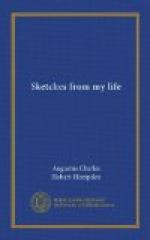I will begin by explaining how we prepared the vessel for the work. This was done by reducing her spars to a light pair of lower masts, without any yards across them; the only break in their sharp outline being a small crow’s-nest on the foremast, to be used as a look-out place. The hull, which showed about eight feet above water, was painted a dull grey colour to render her as nearly as possible invisible in the night. The boats were lowered square with the gunnels. Coal was taken on board of a smokeless nature (anthracite). The funnel, being what is called ‘telescope,’ lowered close down to the deck. In order that no noise might be made, steam was blown off under water. In fact, every ruse was resorted to to enable the vessel to evade the vigilance of the American cruisers, who were scattered about in great numbers all the way between Bermuda and Wilmington—the port at the time I write of most frequented by blockade-runners. While speaking of the precautions used I may mention that among the fowls taken on board as provisions, no cocks were allowed, for fear of their proclaiming the whereabouts of the blockade-runner. This may seem ridiculous, but it was very necessary.
The distance from Bermuda to Wilmington (the port we were bound to) is 720 miles. We started in the evening. For the first twenty-four hours we saw nothing to alarm us, but at daylight the second day there was a large American cruiser not half a mile from us, right ahead, who, before we could turn round, steamed straight at us, and commenced firing rapidly, but very much at random, the shot and shell all passing over or wide of us.
Fortunately, according to orders to have full steam on at daybreak, we were quite prepared for a run; and still more fortunately a heavy squall of wind and rain that came on helped us vastly, as we were dead to windward of the enemy; and having no top-weights we soon dropped him astern. He most foolishly kept yawing, to fire his bow-chasers, losing ground every time he did so. By eight o’clock we were out of range—unhit; and by noon out of sight of anything but smoke.
Luckily, the chase had not taken us much off our course, as the consumption of coal during a run of this sort, with boilers all but bursting from high pressure of steam, was a most serious consideration—there being no coal in the Confederate ports, where wood was only used, which would not suit our furnaces.
We were now evidently in very dangerous waters, steamers being reported from our mast-head every hour, and we had to keep moving about in all directions to avoid them; sometimes stopping to let one pass ahead of us, at another time turning completely round, and running back on our course. Luckily, we were never seen or chased. Night came on, and I had hoped that we should have made rapid progress till daybreak unmolested. All was quiet until about one o’clock in the morning, when suddenly, to our dismay, we found a




